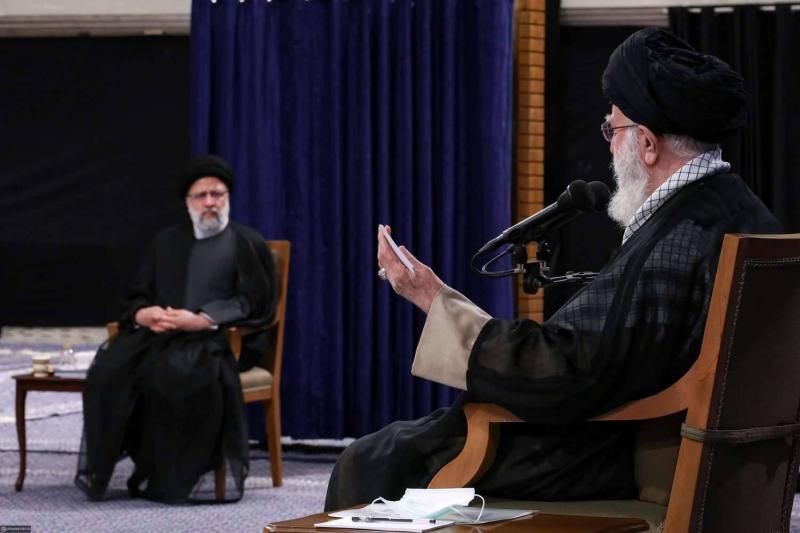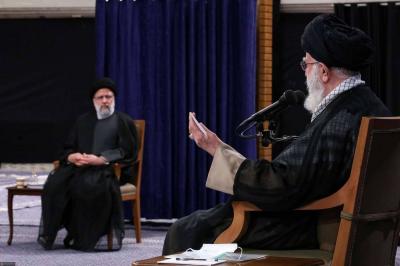The developments accompanying the presidential race and the struggle for leadership of the executive authority have revealed a fierce battle within the conservative faction or the political bloc representing the official discourse of the regime and the deep state system.
In recent days, particularly after the death of President Ebrahim Raisi, internal Iranian events have attracted the attention of international and regional political circles, either in terms of speculations about the nature of the helicopter crash that transported the president and his accompanying team—whether it was an accident due to natural factors, a result of external sabotage, or a consequence of internal power struggles—or regarding the nature of the president who will succeed Raisi at the helm of executive power. Questions arise on how the presidential race will conclude, deciding whether a hardline president will continue the legacy of the late president or if a moderate president will emerge, showing signs of moderation or representing the moderate wing within the official conservative current.
Despite the intensifying electoral battle, it is certain that next week will see a continuation of uncertainties unless decisions from the Guardian Council materialize, along with the names that will emerge from the filtering process that determines the eligibility of candidates. It is expected that more than 70 candidates out of the 80 who submitted their candidacy papers during the first stage at the Ministry of Interior will be disqualified from the race. The developments accompanying the presidential race and the struggle for leadership have revealed a fierce two-phase battle within the conservative faction. The first phase involved a broad assault by members of this faction to present their candidacies, while the second phase is expected to commence after the Guardian Council expels names not suitable for this phase, as per the dictates of the deep state. However, key figures did not wait for the Council's decisions and preemptively launched attacks on their potential opponents, hoping to bolster their electoral positions by undermining the opposition. One notable aspect of this early battle revolves around media engagements between leading candidates, such as Parliament Speaker Mohammad Baqer Qalibaf, former Secretary of the Supreme National Security Council Saeed Jalili, and former Parliament Speaker Ali Larijani.
What stands out in this election and invites reflection is that it will be confined to representatives from all segments of the conservative faction, with the extensive maneuvering among candidates revealing the extent of decline in the status of the presidency and executive power, particularly following the last elections in 2021 and the engineering processes conducted by the regime to install its preferred candidate at the expense of popular participation, which did not exceed 31 percent of more than 63 million eligible voters. The elected president then garnered around 67 percent of the votes cast by approximately 30 million voters.
The death of Raisi and the immutable strategic principles of the supreme leader spurred all candidates who registered to enter this political bazaar, aspiring to enter a space that no longer requires presenting a government work program on political and economic fronts, but merely announcing commitment to operate within the guidelines of the regime's leadership and the supreme leader. Notably, Ali Larijani initially distinguished himself by stating that Iranian interests would dictate foreign policies in his political program, alongside a commitment to addressing the economic situation and remedying its deficiencies.
The experience of Mahmoud Ahmadinejad's presidency initiation in 2005, which took the political and even conservative circles by surprise, particularly as it deviated from established expectations and electoral processes, likely encouraged many of the ministers who worked with him to nominate themselves in this race, believing they could replicate Ahmadinejad's role while adhering to the guidelines set by the supreme leader, without considering a repeat of Ahmadinejad's defiance during the last two years of his second term.
While the electoral battle will mainly unfold within the conservative faction—with an expectation of intensity beyond what was witnessed in parliamentary elections—divisions within this faction are anticipated to escalate. A psychological warfare is being waged among the key players against their competitors, starting with exposure of corruption files and subsequently promoting the likelihood of their exclusion by the Guardian Council for reasons concerning the interests of the regime and authority.
This open conflict within the conservative faction could delay clear outcomes until the second round of elections scheduled for the week following the first round, which will take place on June 29. This scenario is specifically undesirable for the supreme leader, who aims to capitalize on the emotional and popular momentum witnessed during the farewell of the late president and increase participation to exceed 60 percent. He seeks to translate this promptly into decisive outcomes from the first round, mitigating concerns over the necessary representation in the upcoming stage, especially amid the potential for changes in the White House and Donald Trump's return to the U.S. presidency.
This situation may allow for one or two candidates from reformist forces to participate in the final race merely as a symbolic presence, indicating their status as spectators aimed at sending a message to the regime and its leadership that the crisis has a structural dimension. Moreover, it indicates a growing level of conflict among pro-regime forces, urging the leadership to recognize the depth of the crisis and the ideological impasse faced by the theocratic system, thereby opening pathways for potential genuine changes within the system's structure in the future.




